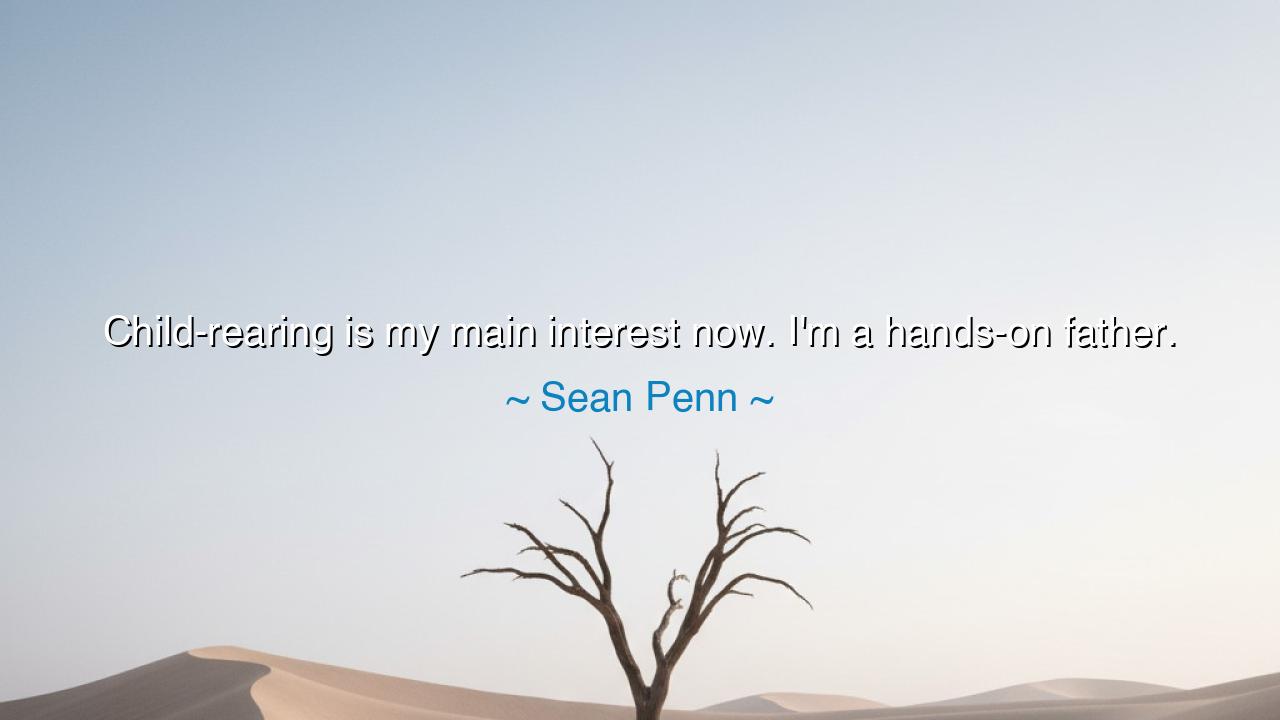
Child-rearing is my main interest now. I'm a hands-on father.






The words of Sean Penn—“Child-rearing is my main interest now. I’m a hands-on father”—speak with a quiet but radiant power. They are the words of a man who has turned from the storms of ambition toward the sacred hearth of family, from the world’s applause to the deeper music of a child’s laughter. Beneath their simplicity lies an ancient truth: that fatherhood, when embraced with both strength and tenderness, is among the highest forms of human devotion. It is not a duty to be managed, but a calling to be lived. Penn’s declaration reveals not the withdrawal of a man from the world, but the evolution of the heart—the realization that the truest measure of greatness is found not in fame or fortune, but in the nurturing of life itself.
In the ancient way, such wisdom would have been revered as sacred knowledge. The philosophers and poets of old taught that to raise a child was to shape the soul of the future. To the Greeks, a father’s role was not merely to provide, but to educate the spirit, to pass on courage, honor, and virtue. The Stoics said that a man who governs himself well becomes a teacher not through speech, but through example. So too does Penn’s statement carry the same spirit: the recognition that hands-on fatherhood is not an act of indulgence, but of moral duty—of being present not only in provision, but in presence, in patience, in love.
Penn’s life, like many who live beneath the fire of fame, has known tumult, transformation, and trial. Yet in this quote, he speaks from a place of arrival, as one who has learned that the work of raising a child is the truest form of artistry. For what greater creation exists than the shaping of a heart, the guiding of a mind, the tending of a young soul? The “hands-on father” is not content to watch from afar or to let the world mold his children in his stead. He steps forward into the living work—messy, exhausting, and divine—of guiding another being toward wisdom and selfhood.
There is a story told of Marcus Aurelius, the philosopher-emperor of Rome, who despite ruling the known world, found his deepest peace in teaching his children. In the pages of Meditations, he does not boast of his armies or conquests, but writes instead of gratitude toward his mentors and of the values he wished to pass to his son. He sought to teach compassion, humility, and courage—lessons that no throne could grant. Like Penn, Marcus knew that true leadership begins in the home, that a man’s legacy is not in what he builds, but in whom he raises. To be “hands-on” is to be present in the daily battles of love, where patience and forgiveness are the tools of kings.
Penn’s words also serve as a quiet challenge to modern man. In an age where distraction and ambition pull fathers away from the sacred duties of the hearth, he reminds us that presence is power. The hands that once reached for glory now hold a child’s hand, and in that gesture lies something greater than worldly triumph. The “main interest” of the father must not be the self, but the next generation. To be a father in truth is not to rule, but to serve; not to lecture, but to listen; not to protect by distance, but by intimacy. This is the ancient art of nurturing, as old as civilization itself, yet too often forgotten.
The essence of Penn’s statement is this: that love is a practice, not a sentiment. The hands-on father builds the foundation of his children’s lives with his time, his effort, and his willingness to be imperfect before them. He becomes both shelter and mirror, showing by his example what it means to live with integrity. His reward is not fame, but the quiet joy of seeing his children grow strong, kind, and brave. This is the invisible heroism of parenthood—the unseen victories of every sleepless night, every patient word, every shared moment of laughter or forgiveness.
So, dear listener, take this teaching as both reminder and call to action. If you are a parent, or hope to be, be present. Do not leave the shaping of your child’s soul to circumstance or to others. Make your love tangible—through patience, through listening, through time freely given. For in every child lies the seed of the future, and in every act of care, the power to change the world. The ancients would say that to guide one soul rightly is worth more than conquering a thousand lands.
Thus, the wisdom of Sean Penn endures beyond the walls of fame and fortune: that in raising a child with your own hands, you raise yourself toward something eternal. To be a hands-on father is to partake in the work of creation, to build not monuments of stone, but hearts of light. And when the years have passed, and all other labors are forgotten, it is this work—the quiet, daily labor of love—that will stand as your truest legacy, shining in the lives of those who follow.






AAdministratorAdministrator
Welcome, honored guests. Please leave a comment, we will respond soon